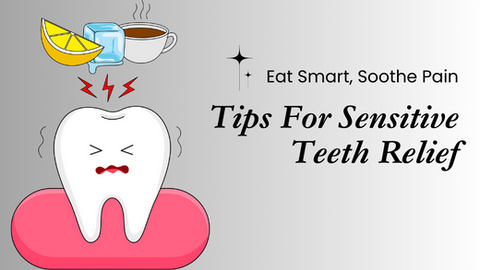Sensitive teeth can be a bothersome condition affecting millions of people worldwide. It occurs when the enamel protecting your teeth becomes thinner, exposing the underlying dentin and nerves to external stimuli such as hot, cold, sweet, or acidic foods and beverages. While there are various causes for sensitive teeth, including dental conditions like cavities and gum recession, diet plays a significant role in exacerbating or alleviating this discomfort.
In this blog post, we'll look into the relationship between your diet and sensitive teeth, highlighting foods to avoid and offering practical tips for sensitivity relief.
Table of Contents:
► Understanding the Causes of Sensitive Teeth
► Foods to Avoid for Sensitive Teeth
► Tips for Sensitive Teeth Relief
Understanding the Causes of Sensitive Teeth
Before delving into dietary considerations, it's essential to understand why certain foods and beverages can trigger sensitive teeth. The outer layer of your teeth, called enamel, acts as a protective barrier. When this enamel wears down or becomes damaged, it exposes the dentin underneath. Dentin contains tiny tubules that connect to the nerve endings in your teeth, allowing sensations to reach the nerves more easily. Therefore, when you consume foods or drinks that are hot, cold, acidic, or high in sugar, they can stimulate these nerves, leading to discomfort or pain.
Foods to Avoid for Sensitive Teeth
Acidic Foods and Beverages
- Citrus fruits (lemons, oranges, grapefruits)
- Tomatoes and tomato-based products (sauces, soups)
- Pickles and pickled foods
- Vinegar and vinegar-based dressings
Explanation: Acidic foods and beverages can erode tooth enamel over time, making the dentin more susceptible to sensitivity. Limiting your intake of these acidic items can help preserve enamel and reduce sensitivity.
Sugary Foods and Drinks:
- Candies, especially sour candies
- Soda and sugary beverages
- Sweet desserts like cakes, cookies, and pastries
Explanation: Sugar promotes the growth of bacteria in your mouth, leading to plaque formation and potential tooth decay. Cavities and decay can further compromise enamel integrity, increasing tooth sensitivity.
Hot and Cold Foods:
- Ice cream and frozen desserts
- Hot beverages like coffee and tea
- Spicy foods
Explanation: Extreme temperatures can cause discomfort for individuals with sensitive teeth, as they can aggravate nerve endings. Gradually introducing hot or cold foods and drinks to your mouth or opting for lukewarm alternatives can help mitigate this sensitivity.
Tips for Sensitive Teeth Relief
Maintain Good Oral Hygiene:
- Brush your teeth twice daily with a soft-bristled toothbrush and fluoride toothpaste. Read Brushing up the success story of Stim Dental Brand.
- Floss daily to remove plaque and food particles from between your teeth.
- Use fluoride mouthwash to strengthen enamel and reduce sensitivity.
Choose Tooth-Friendly Snacks:
- Opt for crunchy fruits and vegetables like apples, carrots, and celery, which can help clean teeth naturally.
- Snack on dairy products like cheese and yogurt, which contain calcium and phosphates that promote enamel remineralization.
Conclusion
Incorporating dietary changes and adopting good oral care products can significantly alleviate sensitive teeth and improve your overall dental health. By avoiding acidic, sugary, and extreme-temperature foods, as well as following practical tips for sensitivity relief, you can enjoy a more comfortable eating experience and maintain a healthy smile for years to come.

